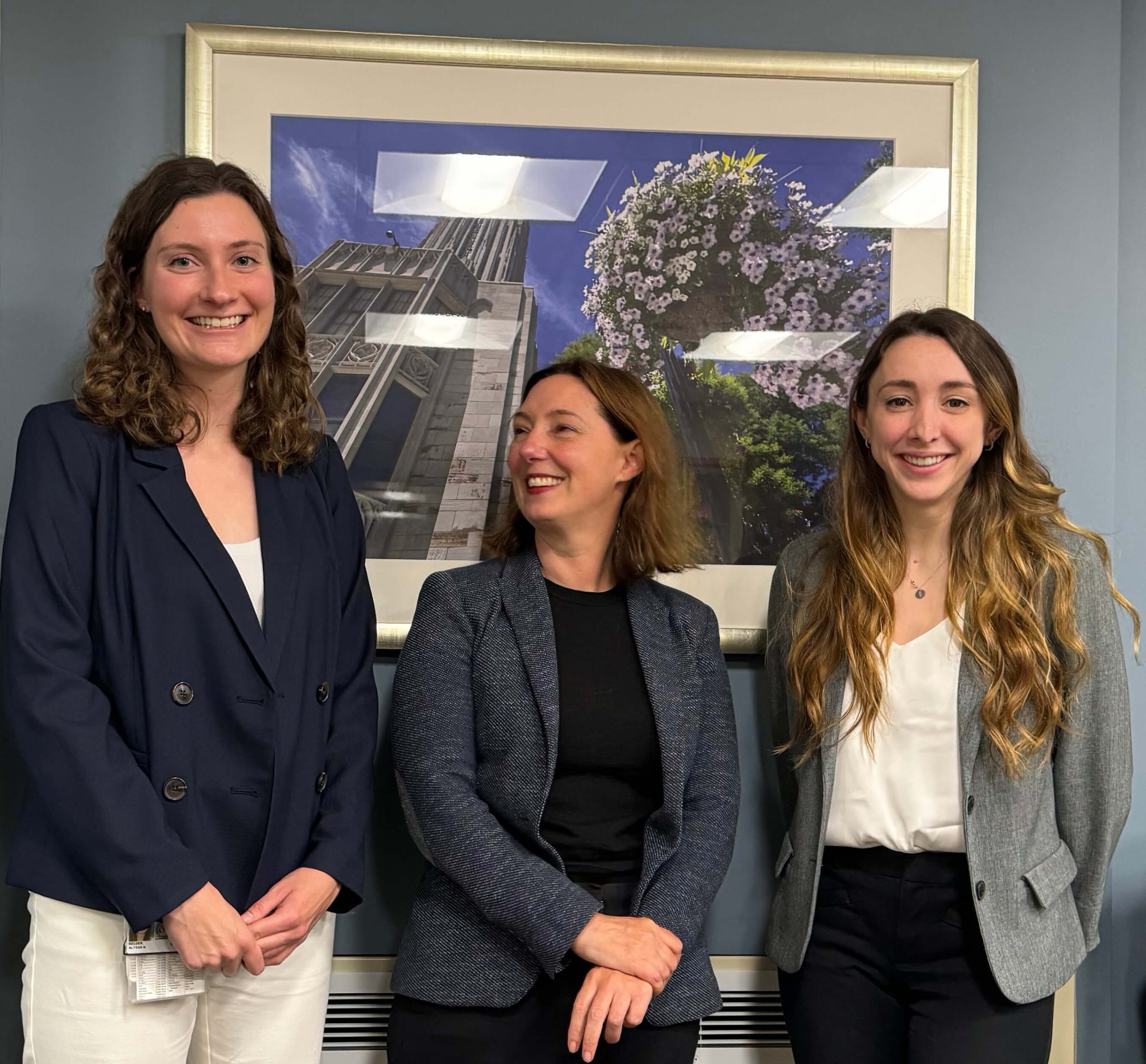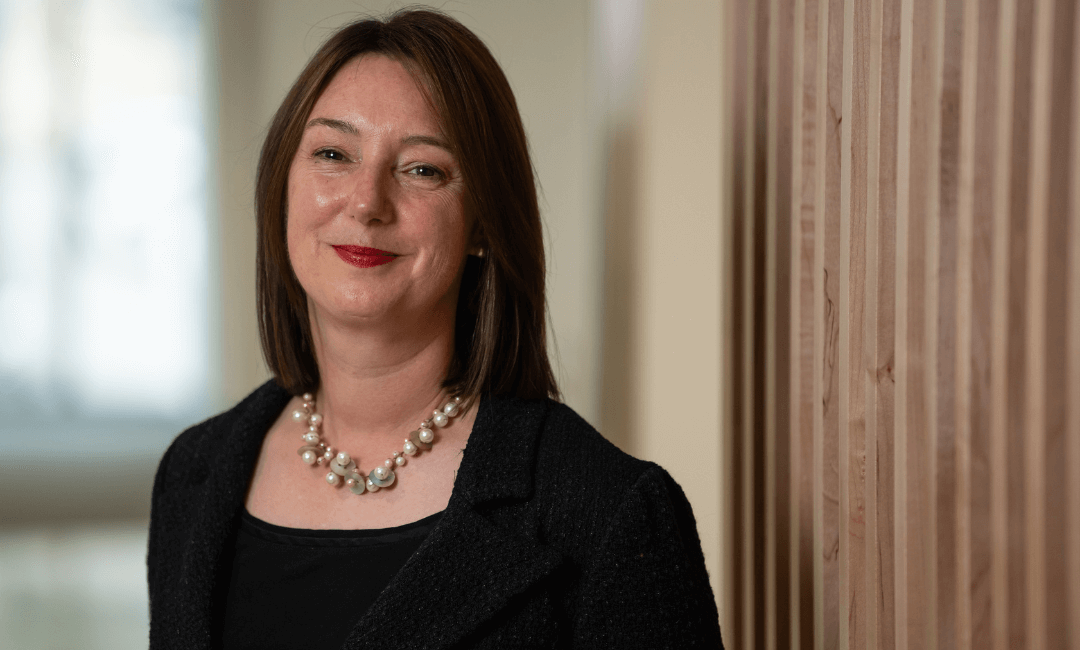Photo credit: Rayni Shiring/University of Pittsburgh
In March, Anne Marie Lennon, MD, PhD, began her tenure as the chair of medicine. A leading innovator in the early detection of pancreatic cancer, Lennon sat down recently with two of the DOM’s Chief Residents, Kate Amodei, MD, and Alyssa Kelder, MD, to answer a few questions.
AML: One of the things that we need to do as leaders is to hear people. I don’t want to talk too much about being a woman. I hope that where we are as a society is that we are appointing people who are great leaders irrespective of our gender, our ethnicity, our age. One of things that is really important to me is that we are welcoming to everybody. What I hope is that everybody who comes to the Department of Medicine feels, no matter who they are, that we are invested in their future and their success. That we are open and transparent. That whoever you are, you can look up, and there’ll be somebody who looks like you. And you can be inspired to do that.
AK: When did you know you wanted to become a physician, and if you could go back to ‘past you’ and tell yourself something, what would you say to yourself as a medical student?
AML: My dad was the first gastroenterologist in Ireland, and from the age of seven, he used to bring me in with him on rounds. I learned a lot about being a doctor from my dad. When you know somebody in medicine, you also understand that it’s not a Monday to Friday job. It’s not a 9:00 to 5:00 job. So, when I went into medicine, I had a very good idea of what it likely was going to be.
I always wanted to be a doctor. A more difficult question is how do you determine a subspeciality? As a medical student, I thought diarrhea was interesting. It was one of two things: either I was weird, or I was destined to be a gastroenterologist!
AK: Someone has to be interested in it, right?
AML: Yes! You asked the question what would I say to myself as a medical student? I love medicine. And now 30 years later, I still love it. Is it a career? Yes, you can have a career, and you can earn enough money to support yourself and your family. But more importantly, medicine is an absolutely wonderful vocation. You get to meet so many different types of people. There are so many opportunities and directions you can take. You can be a clinician, a researcher, or an educator. Something which very few jobs allow you to do is that you can change direction as you go through life in medicine. You can do many different things. I started my career as a clinician. Then, I did more and more research and became a clinician-scientist. And, finally, I moved into leadership. Medicine is unique in the way it allows you to pivot at different times in your career.
KA: You mentioned all the different directions that you explored in medicine. What was it about research that drew you down that path initially?
AML: My interest in research was spurred through an interaction I had when I was a first-year gastroenterology fellow. I looked after two patients in their 20s with hereditary colon cancer, who later passed away. That had a huge impact on me and made me ask, “How can I make a difference? How can we detect cancer earlier?” That led me to do a PhD on early detection of colon cancer. This helped me understand the impact that basic and translational research can have on how we care for patients and the opportunities for partnership between clinicians and scientists.
My area of expertise now is pancreatic cancer. As a clinician, I tell patients “This is where we are in 2024, and this is the standard of care.” But the survival rate for pancreatic cancer is an abysmal 13%, with almost 90% of patients dying from their disease. How can we change that? The answer is research. One of the things that I have most enjoyed in my career is partnering with superb scientists and working together to improve our understanding of a disease and outcomes for our patients. So, when I talk to my patients, I can say that this is where we are now, but this is where we’re trying to go. Research is hard, and it doesn’t always work out, but when it does, it’s wonderful to play a part in changing the future and doing things that will help our patients.
AK: I think that’s a really beautiful way to view research as a whole, in that we’re helping improve medicine for the future. Along those lines, we have a lot of non-clinical faculty working on bridging the bench to bedside. What are some of the ways the department is trying to recruit more folks in a non-clinical capacity?
AML: My number one interest is the people who are here and ensuring their success, whether you are in the lab, are in clinical care, or are educating the next generation. Each of these pathways are the foundation on which our department’s success is built. Each is equally important. My job is to ask how can we help the people who are here, how can we ensure their wellbeing, how can we help their careers, how can we help them reach their goals? After that, we can look at recruiting individuals who will complement our community to make us even stronger and better.
KA: I think that’s great. Focusing on the talent that you have, fostering that talent, and promoting leaders from people you’re mentoring. Something that has stood out to us too is how you’re prioritizing meeting the residents and all the faculty within the Department of Medicine on an individual level. How are those meetings going? Has anything surprised you so far?
AML: Meeting with faculty and residents has been one of the highlights for me. I really enjoy learning from our faculty what the things are that make this a great department. It’s also important as a leader to understand what are the challenges that people face and how we can help. Finally, what are the opportunities that we should implement as a department. One of the most important concepts that has changed for me is, that before I came, I thought this was a great department. Now having met people here, I believe we have not only a great, but an incredible department.
AK: Keeping that in mind, what is your vision for the Department of Medicine in the next few years?
AML: I have something to show you (leaves and reemerges with a framed document). This is the current mission statement of the Department of Medicine (proceeds to read a dull, boilerplate statement). I want us to be leaders in research, education, and clinical care at both a national and international level. For example, how can we be engaged in transformational research that changes the way we understand a disease or changes the way in which we provide care. How can we not only provide world-class care for patients, but also lead innovation in how to deliver that care to patients. And, how can we provide world-class educational programs, which will train and nurture the next generation.
So far, I’ve met with 483 faculty, in addition to the residents and postdoctoral fellows. These meetings have allowed me to identify opportunities for improvement, alignment, and investment that will form the foundation of our strategic planning process, which is already underway. I appreciate the input that we have already received, and I look forward to continuing to involve our faculty, trainees, and staff in this process. This will include developing a vision, mission, a SWOT analysis, defining our core values, goals, objectives, and action plans for the next 5 years. It is important to highlight that people will have the opportunity to provide feedback via online surveys, as we move through this process. We will be initiating several strategic committees focused on addressing issues and opportunities we have identified through discussions with people over the last six months. I am asking people to raise their hands and participate in these committees. We will be sharing more about the progress of the strategic plan, as well as opportunities to participate in the strategic committees, in upcoming communications.
KA: As we look to the future, AI is something that’s on everyone’s mind. What are some ways you envision that being pulled into our practice here?
AML: AI offers lots of opportunities to help us find solutions to challenges that face us. For example, there are 26 million adults with diabetes of whom almost half have uncontrolled disease. As of 2024, there are only 8,976 endocrinologists in the USA. How do we deliver high-quality care to these patients while promoting wellbeing in our physicians and staff? AI offers one approach to help us with these types of questions. We are extremely well positioned to try to answer these types of questions with many leaders in the field of AI at Pitt and UPMC as well as collaborators at CMU. One example from our own department is Dr. Shiv Rao. A faculty member in cardiology, he founded Abridge, which leverages the use of generative AI in healthcare and whose documentation system is now being used in clinics across UPMC.
KA: You mentioned being welcoming to everyone. I know something you brought up at our meetings is your involvement in street medicine. Are there ways you envision us being able to establish stronger connections with the Pittsburgh community itself?
AML: It’s very important for us to engage in our community. It is a fundamental part of who we are. One of the questions for all of us is where do people need us, how can we help, and what are our opportunities to be impactful? As leaders, it’s important to lead by example. It says who we are. We have five free health clinics as well as the homeless street rounds. I have very much enjoyed attending the street rounds because it allows me to give back to our community, gives me joy, and reminds me of why I entered medicine.
AK: I think that’s great too, that you’re actively setting the example as a leader of doing things that bring you joy and giving back to the community. It’s easy to say, “I’m too busy, I’m too busy,” but seeing your leader do those things, I think it’s really impactful. Is there anything else you would like to share?
AML: We’ve got some of the best and brightest people here. We have incredible clinicians providing incredible care, scientists doing groundbreaking work, and wonderful educators training the next generation. We should be really proud of who we are. It’s an incredible department of medicine, and we have the opportunity to change the way that clinicians or scientists across the world think about a disease, the way that we care for patients, and the way that we teach. We have the opportunity to break down silos, bring people together, and do the things that bring us joy, while being impactful and leading the future of medicine.

Drs. Alyssa Kelder, Anne Marie Lennon, and Kate Amodei
KA: Sounds like a great draft of a mission statement!

